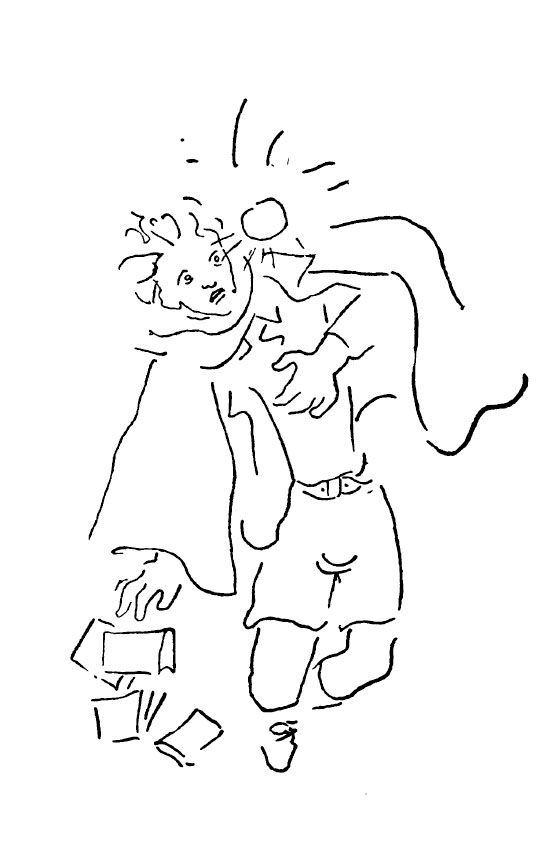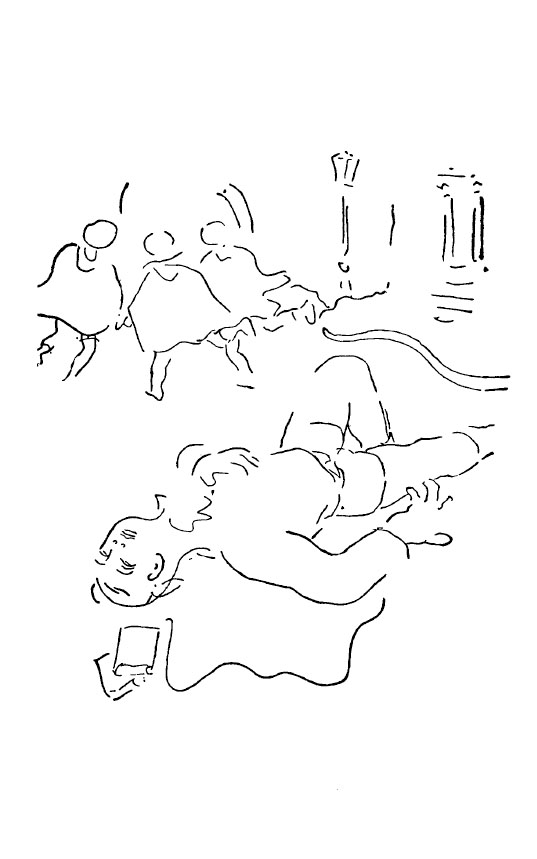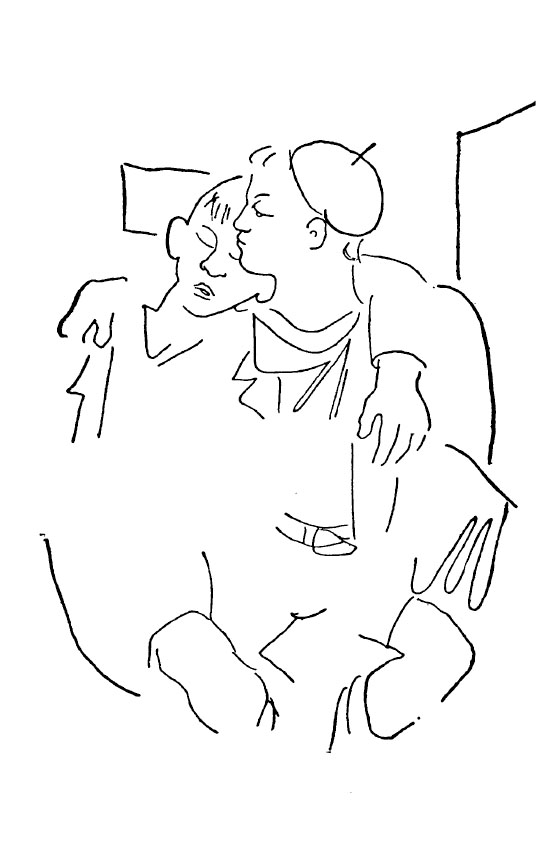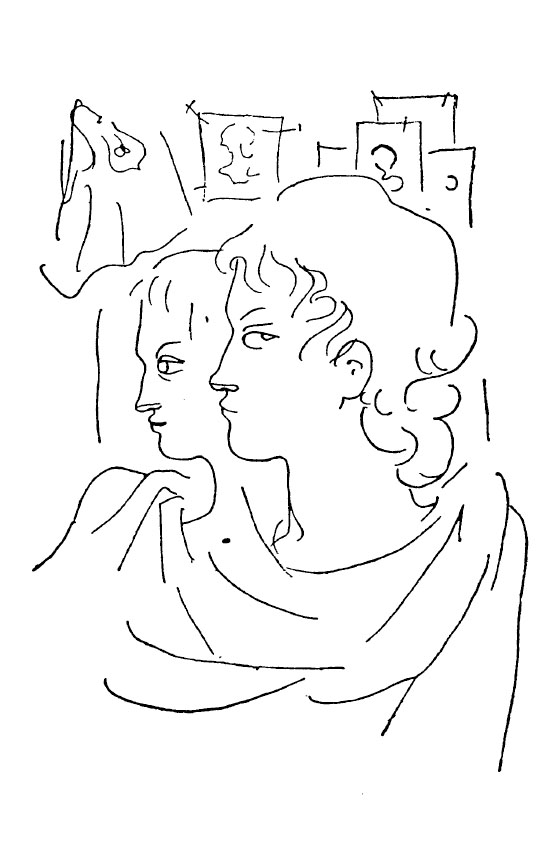The Holy Terrors (Les Enfants Terribles) (2 page)
Read The Holy Terrors (Les Enfants Terribles) Online
Authors: Jean Cocteau

They bore the victim into the porter’s lodge, where the kindly porter’s
wife did her best to bathe him and restore him.
Dargelos stood in the doorway, backed by a throng of curious faces. Gérard knelt
beside his friend, tearfully clasping his hand.
“Tell me what happened, Dargelos,” said the proctor.
“There’s nothing to tell, Sir. Some of the fellows were chucking snowballs.
I chucked one at him. It must have been a hard one. It hit him smack in the chest and he
went ‘Ho!’ and fell down. At first I thought his nose was bleeding from
another snowball that had hit him in the face.”


“A snowball wouldn’t crack a person’s ribs.”
“Sir, Sir!” cried the boy who answered to the name of Gérard.
“He put a stone inside that snowball.”
“Is that true?” inquired the proctor.
Dargelos shrugged his shoulders.
“Haven’t you anything to say?”
“What’s the use…. Look, he’s opening his eyes. You’d
better ask him.”
The victim was beginning to show signs of life. Gérard slipped an arm under his
head, and he lay back against it.
“How are you feeling?”
“Sorry….”
“There’s no need to apologize. You’re ill; you fainted.”
“I remember now.”
“Have you any idea what made you faint?”
“A snowball hit me in the chest.”
“A snowball? Why should that make you faint?”
“It’s the only thing that hit me.”
“Your friend has given me to understand that this particular snowball had a stone
in it.”
The patient saw Dargelos shrug his shoulders.
“Gérard must be cracked,” he said. “You’re cracked. It
was just an ordinary snowball. I was running; I expect I sort of blew up.”
The proctor breathed a sigh of relief.
Dargelos seemed about to take his leave, then changed his mind and advanced a few paces
in the direction of the victim. But when he reached the porter’s counter, on
which were displayed such goods as ink, candy, pen-holders, he stopped short, pulled a
couple of pennies from his pocket, flung them down, picked up a twist of
licorice—the kind so popular with boys, that looks like shoelaces—crossed
the hall, raised one hand in a sort of military salute, and disappeared.
The proctor had already called a cab, intending to see the patient home, but
Gérard objected that it was unnecessary. He declared that the sight of the
proctor would alarm the family, and that he himself would be his escort.
“Anyway,” he added, “he’s much better now—you can
see.”
The proctor needed little persuasion. It was snowing hard. The lad’s home was in
the rue Montmartre.
Having seen them into the cab and observed Gérard in the act of removing his cloak
and woolen muffler to wrap them round his friend, the proctor concluded that he was
justified in washing his hands of further responsibility.
T
HE WHEELS turned
slowly on the slippery road. Huddled in one corner, Gérard gazed at the head
beside him, so pale it seemed to make the farther corner luminous, and bobbing forlornly
with the convulsive bobbing of the cab. The closed eyelids were barely visible, the
nostrils and lips a shadow merely, still flecked with crusts of blood. He murmured:
“Paul….”
Paul heard; but he was sunk in such leaden lassitude that he could not move his tongue.
He slid a hand out of his laprobes and wrappings and put it over
Gérard’s.
A child’s reaction to this type of calamity is twofold and extreme. Not knowing
how deeply, powerfully, life drops anchor into its vast sources of recuperation, he is
bound to envisage, at once, the very worst; yet at the same time, because of his
inability to imagine death, the worst remains totally unreal to him.
Gérard went on repeating: “Paul’s dying; Paul’s going to
die”; but he did not believe it. Paul’s death would be part of the dream,
a dream of snow, of journeying forever. For though he loved Paul as Paul loved Dargelos,
it was by being weak, not strong, that Paul had subjugated him. Dargelos was the flame
that drew Paul’s tranced, obsessive gaze; he, Gérard, who was strong and
just, must therefore be Paul’s guardian, must watch him surreptitiously, save him
each time he seemed about to singe his wings. What a fool he’d been on the porch!
… pretending not to notice that Paul was looking for Dargelos, telling himself
he’d teach Paul a lesson…. The same compulsion that had hurled the
infatuated Paul towards the fray had pinned, transfixed him, Gérard, to the spot.
From afar he had seen Paul drop, lie bleeding, senseless, with something in his attitude
… in the kind of attitude that seems to warn the frivolous spectator to keep his
distance. Then, not daring to approach for fear Dargelos and his gang would keep him
away from the authorities, he had taken to his heels and run for help.
But now once more the customary rhythm was reestablishing its sway; once more he was at
his post, watching over Paul. Now he was bearing him away. He was soaring into a
dream-world of transcendent ecstasy. The soundless wheels beneath him, the glitter of
the street lamps combined with his sense of dedication to weave a magic spell.
Paul’s weakness seemed to him to turn to stone, to acquire concrete and finite
dimensions, and he felt that, in bearing it, he had found a cause worthy of his
strength.

Suddenly it struck him that he had accused Dargelos. Spite had prompted him to perpetrate
an act of malice and injustice. He remembered the porter’s lodge, that shoulder
shrugged in scorn, Paul’s blue reproachful eye, Paul’s superhuman effort
to declare, “You’re cracked!”—and thus to acquit the culprit.
He felt uneasy, tried to dismiss the matter, telling himself by way of self-excuse that
a snowball in Dargelos’ iron hands could be a weapon potentially more lethal than
his own nine-bladed penknife. Surely Paul would forget the incident. At all costs the
true world of childhood must prevail, must be restored; that world whose momentous,
heroic, mysterious quality is fed on airy nothings, whose substance is so ill-fitted to
withstand the brutal touch of adult inquisition.
On went the cab, jogging through the open firmament. Stars came towards it, splintering
the dim shower-whipped windows with fiery particles of light.
Suddenly a cry was heard, two plaintive notes. Piercing, human they swelled, inhuman; the
panes rattled; the fire brigade went storming by. Through chinks in the frosted glass
Gérard could discern the bases of the engines, the scarlet ladders, the firemen
standing motionless, gold-helmeted in their niches, like allegorical figures on a
monument. A ruddy flicker danced across Paul’s face. Gérard fancied him
reviving. But the last of the whirlwind passed, leaving him death-pale as before. It was
then that Gérard noticed that the hand in his own was warm, and understood that
his ability to play the Game stemmed from this link with living warmth.
The word “Game” was by no means accurate, but it was the term which Paul
had selected to denote that state of semi-consciousness in which children float
immersed. Of this Game he was past master. Lord of space and time, dweller in the twilit
fringes between light and darkness, fisher in the confluent pools of truth and fantasy,
he had built himself a kingdom in his classroom, sat at his desk enthroned while
Dargelos bowed in homage, obedient to his will.
“Can he be playing the Game?” thought Gérard, clasping Paul’s
warm hand, staring intently at the face supine in its corner.
Without Paul’s presence, this cab would have been nothing but a cab, the snow no
more than snow, the lamps mere lamps, this return journey a humdrum routine affair. Too
homespun by nature for any self-induced delirium, Gérard was totally possessed by
Paul, whose spell had finally pervaded his entire consciousness. Instead of learning
grammar, arithmetic, geography, natural history, he had been made free of such a sphere
of sleep as wafts the waking dreamer past danger of recall, and restores to things their
veritable meaning. The opium hidden in their desks—in the shape of pieces of
chewed eraser, broken pen-holders—provided these infant addicts with a drug as
potent as any drowsy sirup of the East.
Could Paul be playing the Game?
Gérard knew better than to suppose that a mere passing fleet of fire engines would
have disturbed him in his play.
He tried to pick up its tenuous threads again, but it was too late. The cab had come to a
halt in front of the door.
Paul roused himself.
“Shall I get help?” asked Gérard. No need. If Gérard would
give him a hand he could manage the stairs … if Gérard would hang on to
his satchel….
Gérard lifted out the satchel, clasped Paul round the waist, and with
Paul’s left arm slung round his neck, started to mount the stairs. On the first
landing he stopped, deposited his precious burden upon a derelict settee with springs
and stuffing bulging through green plush upholstery. He went towards the right-hand door
and touched the bell.
Footsteps sounded; ceased. Silence.
“Elisabeth!” Still not a sound.
“Elisabeth!” called Gérard in an urgent whisper. “Open the
door. It’s us.”
“I shan’t open the door!” remarked a small stubborn voice from the
other side of it. “I’m sick to death of boys. Turning up at this hour of
the night—you must be mad. I’m fed up with you.”
“Lisbeth, do open the door,” insisted Gérard. “Hurry up,
Paul’s ill.”
There was a pause; then the door opened just a fraction and the voice was heard to
say:
“Ill? You can’t catch me. I know you’re only trying to make me let
you in. You’re telling an untruth, aren’t you? Are you?”
“Paul’s ill, I tell you, do buck up. He’s on the settee, he’s
shivering.”
The door opened wide to reveal a girl of sixteen, with a strong physical resemblance to
Paul. She had the same blue eyes shadowed by dark lashes, the same pallor of complexion.
But whereas the lines of his face betrayed a certain weakness by comparison, hers, two
years older, beneath soft curling hair, had already ceased to be a sketch for the
finished portrait, was already groping for its organic principle and racing, disheveled,
to overtake its final beauty.
It was her whiteness that loomed first against the hall’s dark background; that,
and the pale blot of the kitchen apron, far too long for her, tied round her waist.
It was true then, not a hoax, she told herself, struck dumb. With Gérard’s
assistance she lifted Paul and helped him in—a reeling figure, his head sunk on
his chest. The moment they were in the hall, Gérard started to make a
statement.
“Idiot,” she hissed. “There you go, as usual—trust you to make
a hash of it.
Must
you shout?
Can’t
you be quiet? Do you want
Mother to hear?”

